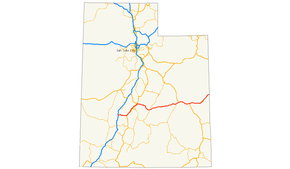Interstate 70 in Utah
| Interstate 70 | ||||
|---|---|---|---|---|

Highways in Utah with I-70 highlighted in red
|
||||
| Route information | ||||
| Defined by Utah Code §72-4-112 | ||||
| Maintained by UDOT | ||||
| Length: | 231.673 mi (372.842 km) | |||
| Existed: | 1957 – present | |||
| Major junctions | ||||
| West end: |
|
|||
|
|
||||
| East end: |
|
|||
| Highway system | ||||
|
||||
Interstate 70 (I-70) is a mainline route of the Interstate Highway System in the United States connecting Utah and Maryland. The Utah section runs east–west for 232.15 miles (373.61 km) across the central part of the state. Richfield is the largest Utah city served by the freeway, which does not serve or connect any urban areas in the state. The freeway was built as part of a system of highways connecting Los Angeles and the northeastern United States. I-70 was the second attempt to connect southern California to the east coast of the United States via central Utah, the first being a failed attempt to construct a transcontinental railroad. Parts of that effort were re-used in the laying out of the route of I-70.
Unlike most Interstate Highways, much of I-70 in Utah was not constructed parallel to or on top of an existing U.S. Highway. Portions of I-70 were constructed in areas where previously there were no paved roads. Because it was built over an entirely new route, I-70 has many features that are unique in the Interstate Highway System. For example, the 110 miles (177 km) between Green River and Salina makes up the longest distance anywhere in the Interstate Highway System with no motorist services. This same piece is noted as the longest highway in the United States built over a completely new route since the Alaska Highway, and the longest piece of Interstate Highway to open at a given time. The construction of the Utah portion of I-70 is listed as one of the engineering marvels of the Interstate Highway System.
...
Wikipedia

